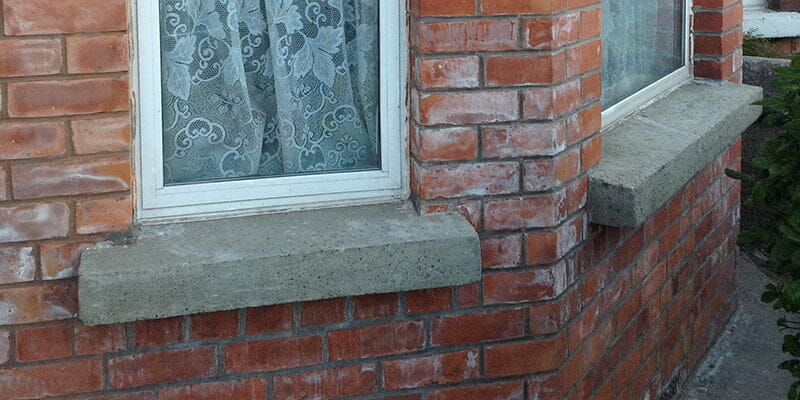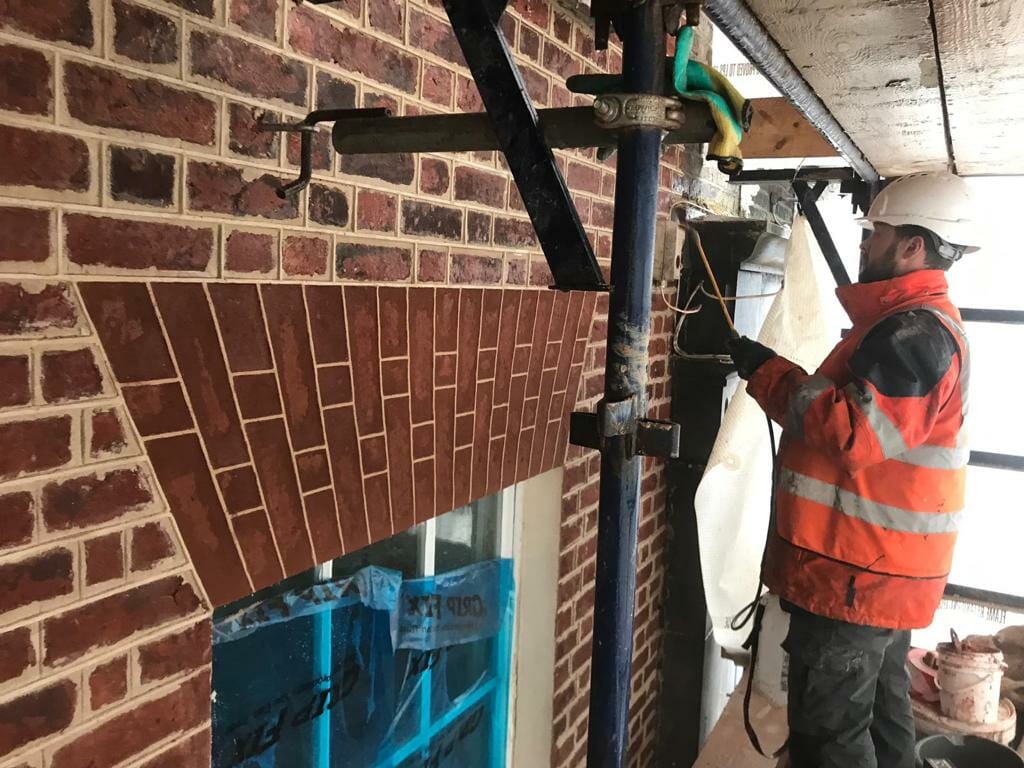Search:

Cleaning stone and masonry, the right way!
We received a call a couple of days ago from a distraught client, asking if we could rescue his Victorian red brick facade. He had hired some contractors to remove the paint from his entire facade and unfortunately they didn’t know what they were doing and caused a lot of damage to his home. Cleaning stone and masonry the right way requires years of knowledge and experience.
The Incorrect use of chemicals can destroy masonry
The contractor applied a chemical to the brick in an attempt to remove the paint (in fact, they had used the incorrect chemical which brought out the salt in the brick), so the contractor proceeded to grind the bricks instead. When this didn’t do the trick, they gave it all a good wash down with a high pressure washer.
The result of this onslaught was that the façade of the house was covered in efflorescence (a white deposit on the surface of the brick). Efflorescence gets worse after a spell of rain, and the saturation of the bricks caused during the power washing heightened the problem. The grinding had removed the patina of the bricks, leaving them totally porous. More pressure equals more water, and if this façade isn’t treated before the winter, the water in the bricks will freeze. The formation of ice inside the brick will lead to them cracking and breaking, which will make the pores bigger and result in the bricks simply crumbling away.
This kind of situation is sadly not uncommon, and this isn’t by any means the first time we have had to repair damage caused by inappropriate cleaning methods. At the risk of repeating ourselves, it’s absolutely crucial that you hire a knowledgeable contractor to clean and treat stone, brick and masonry. In this instance, we were able to reassure the client that he had come to the right place and we would be able to salvage the situation.
Why you should only use experienced contractors
Removing paint and cleaning a brick or stone façade is a costly process, so it’s easy to be swayed by a contractor who offers to do it for a third of the price. Of course, any guy with a pressure washer can come along and blast your façade, it’s not surprising they don’t charge much. And sure, the initial results can look really good… you’ll be really pleased and wonder how companies like PMac get away with charging triple what you’ve just paid for the exact same job?! Potential clients do ask us this, and we have plenty of examples of why the cheap solution is never the best solution for such a valuable investment as a building.
The use of incorrect chemicals and too much water on your red brick can have a devastating effect – bringing out the salts in the brick, causing efflorescence. The same problem occurs on white stones such as Limestone, Portland stone and Marble. Too much water saturates the stone, causing brown alkaline staining on the surface of your stone. This will not be noticeable at first, it may take weeks for the staining to appear, however once it does the problem will only get worse the more water is ingressed.
And now to the evils of the power washer!
While we have nothing against Karcher products, or people offering pressure washer services, there is a time and place for everything. Power washers do certainly have their place, but not when it comes to cleaning red brick facades, or any type of marble, stone, façade or patio. They should definitely not be used on any type of modern render, such as Monocouche or Techcrete. These thin renders cannot withstand any pressure and will crumble.
Pressure washing means more water – the higher the pressure, the more water you are using. So, from an environmental point of view this is not a good idea.
Apart from the harmful effects pressure washing has on the environment, the saturation of your stone and brick with water can have a detrimental effect. The pressure removes the patina, or natural waterproof coating, of your stone. This allows for the further ingress of water, which causes major headaches down the line: staining and freeze/thaw problems as referred to above. Read more on Brick cleaning services
Power washers are effective on hard non- porous materials
There are certain situations where pressure washing is useful and produces great results. Granite paving, for example.
Pressure washing is also useful for removing paint from stainless steel. We use pressure washers for cleaning streets, where the amount of lose contamination means that high volumes of water are necessary.
These are, however, the only situations where we would use our pressure washers. They aren’t suitable for the masonry and façade cleaning we carry out.
Domestic pressure washers
Small domestic pressure washers are very popular now. They’re cheap and easy to use, but we would advise you follow the instructions carefully and watch some of Karcher’s informative YouTube videos before you start. The tip at the end of the lance on domestic power washers is pencil sharp and will cause serious damage to your stone, cobble lock, brick or tarmac. The high water pressure is faster to use and immediate results are impressive, but we advise you to lower the pressure by widening the nozzle at the end of the lance – the job will take a little longer, but you will exert less pressure on your stone and cause less damage.
It gives us no pleasure to arrive on site and see a building damaged from incorrect cleaning methods. Always ensure your contractor has a good track record and experience dealing with the material they are coming to clean. And if a price is significantly lower, ask yourself why. If a contractor arrives to clean your brick or stone, and starts getting a pressure washer out of the van, it’s time to start asking some questions! Remember, pressure washers are used to cut through concrete, they’re THAT powerful!
Get in touch
Our legacy is quality projects we can be proud of. We value the inputs of our customers, our team and our supply chain in reaching positive outcomes. Health and safety to our people and the public is a priority for us and without compromise.
If you are working on a similar project we would love to hear about it. Dont hesitate to call us or send in the details of your project through our contact page at https://pmac.ie/contact-pmac/
PMAC is a registered Heritage Contractor and a link for the site can be found below.
https://heritageregistration.ie/heritage-contractors-listing/



